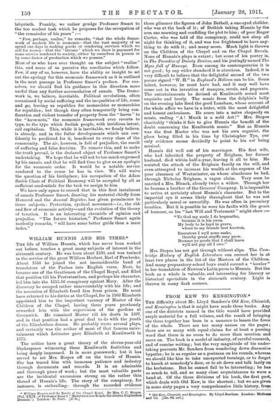WILLIAM HUNNIS AND HIS TIMES.*
THE life of William Minnie, which has never been worked out before, touches a great many subjects of interest in the sixteenth century. He was born about 1530, and was trained in the service of the great William Herbert, Earl of Pembroke. About 1550 he joined the not inconsiderable band of translators of the Psalms into English verse. Next, he became one of the Gentlemen of the Chapel Royal, and filled that position till his Protestantism, and perhaps his character, led him into the 1555-56 conspiracy against Mary. After the discovery he escaped rather unaccountably with his life; and the accession of Elizabeth freed him from prison. He must have returned to his duties at the Chapel, for in 1566 Elizabeth appointed him to the important vacancy of Master of the Children of the Chapel, having three years previously rewarded bins with the supervision of the gardens at Greenwich. He remained Master till his death in 1597, and in that position had a great deal to do with the youth of the Elizabethan drama. He probably wrote several plays, and certainly was the author of most of that famous enter- tainment which Leicester gave Elizabeth at Kenilworth in 1575.
The critics have a great theory of the eleven-year-old Shakespeare witnessing these Kenilworth festivities and being deeply impressed. It is mere guesswork; but it has served to set Mrs. Stopes off on the track of Hunnis. She has traced him with immense patience and industry through documents and records. It is an admirable and thorough piece of work ; but the most valuable parts are the incidental excursions strung on the rather thin thread of Hunnis's life. The story of the conspiracy, for instance, is enthralling: through the recorded evidence
• William Hunnis and the Rawls of the Chapel Royal. By Mrs. C. C. Stoves. (Vol, XXIX. of Professor Bang's " Idaterialen zur Kande des alter= Engliaohen Dramas.") London : D. Nutt. [27 fr.]
there glimmer the figures of John 13ethell, a one-eyed clothier. who was at the back of it; of Dethick taking Hunnis by the arm one morning and confiding the plot to him; of poor Roger Carter, who was told of the conspiracy, could not sleep all night for thinking of it, and was too frightened to have any- thing to do with it; and many more. Much light is thrown on the Children of the Chapel and on the Chapel Revels. None of Hunnis's plays is extant ; but some of his poetry is; in The Paradice of Dainty Devices, and his jestingly named The Hyve full of Hunnye. Even among its contemporaries it is not good; by any wider standard it is atrocious. Indeed, it is very difficult to believe that the delightful second of the two poems signed "W. H." in England's Helicon can be his. Some talent, however, he must have had, and it may well have come out in the invention of masques, revels, and pageants.
The entertainments he devised at Kenilworth sound most exquisite and lovely. The music from the dolphin's belly on the evening lake fired the good Laneham, whose account of the whole affair we have in a letter, with the most delightful and honest enthusiasm. He soars into a naive rhapsody on music, ending " A ! Muzik is a nobl Art !" Mrs. Stopes charitably "thinks it fair to give Hunnis the benefit of the doubt concerning the Kenilworth music." But as Hunnis was the first Master who was not his own organist, the place being filled in his time by Christopher Tye, our only evidence seems decidedly to point to his not being musical.
Hunnis did well out of his marriages. His first wife, who had inherited the property of Brigham, her former husband, died within half-a-year, leaving it all to him. He resisted the attack of the Brigham family on the will, and even attempted to increase his wealth at the expense of the poor almsmen of Westminster, on whose almshouse he had, through Nicholas Brigham, a vague claim. Very soon he married a Mrs. Blanck, already twice a widow. Through her he became a brother of the Grocers' Company. It is impossible to arrive at certainty about Hunnis's character. But to the impartial eye it seems likely throughout that he was not particularly moral or unworldly. He was often in pecuniary troubles. But it is possible he wore his faults with the grace of humour, as his "last Will and Testament" might show :—
"To God my soule I do bequeathe, because it is his owen.
My body to be layd in grave, where to my friends best knowen.
Executors I wyll none make, thereby great stryffe may grow. Because ye goods that I shall leave wyll not pay all I owe."
Mrs. Stopes has not got through without slips. The Cam- bridge History of English Literature can correct her in at
least two places in the list of the Masters of the Children. And many preparatory-school boys could correct a " howler " in her translation of Newton's Latin poem to Hunnis. But the book as a whole is valuable, and interesting for literary or historical specialists in the sixteenth century. Light is thrown in many dark corners.






















































 Previous page
Previous page